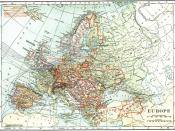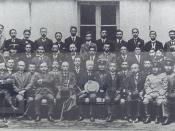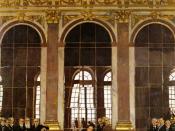On May 4, 1919, over three thousand Chinese students gathered in the streets of Beijing, finally taking political action. It had been announced several days earlier that China's requests had been denied at the Paris Peace Conference. This meant that Germany's territorial rights in China were not to be returned, but instead given to the Japanese. This infuriated the citizens of China, who demanded for changes to be made.
The protest initiated in Tiananmen Square and the students marched through the capital. Pamphlet literature was distributed throughout the crowd as they journeyed toward their destination. The officials did not take much notice of the parade, for their quiet demeanor drew little attention. Only when they reached the home of pro-Japanese minister, Tsao Rulin, did chaos erupt.
The protesters avidly shouted the slogans: "Struggle for the sovereignty externally, get rid of the national traitors at home", "Do away with the 'Twenty-One Demands'" and "Don't sign the Versailles Treaty"(May Fourth Movement).
They demanded for the traitors Tsao Rulin, Zhang Zongziang and Lu Zongyu, who held important posts as diplomats, to be punished. Tsao managed to flee in the midst of confusion, but the Japanese minister, Chang, was not so lucky and was ruthlessly beaten. Parts of Tsao's house were burned and before more destruction could take place, the police arrested the demonstrators and marched them toward imprisonment.
The bystanders watched with admiration as the rallying young students made their statement. The audience regarded these students as heroes for finally taking action instead of simply talking about it. Some spectators were even brought to tears of joy as they watched the anti-Japanese, reformist flags waving about the streets.
The following day, students all over the country went on strike. In order to support the student's struggle, workers and businessmen from other cities...


